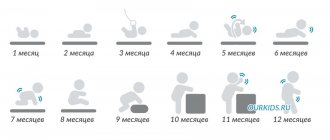How long should children sleep?
At nine months, intensive development occurs in all areas:
- physical (growth, development and strengthening of the body occur);
- psychological (elements of perception are formed);
- social (communication skills).
The child spends a lot of energy while awake. The body needs time to regain strength. In most cases, during this period, an important skill is mastered - walking. Lack of sleep negatively affects the child’s behavior, condition and ability to learn new knowledge.
Pediatricians say that the norm for this age is to sleep 12-15 hours a day. The total number is divided into 10 hours during the night period, the remaining hours are during the daytime. In most cases, daytime sleep occurs 2 times and lasts 2.5 hours.
Attention! If a child wakes up at 6 or 7 in the morning, then during the day he should sleep 3 times for 1-2.5 hours. The third time the duration can be reduced to 30-40 minutes.
A 9-month-old baby should sleep at least 12 hours a day, since active growth and development of the body occurs during rest. Komarovsky also agrees with this statement. Quality rest allows you to:
- recover;
- accumulate energy for games and communication;
- improve the process of assimilation of new information;
- gain new knowledge and skills faster;
- reduce stress (physical and emotional).
Doctors have found that during deep and long sleep a child’s immune system is strengthened.
Full development depends on adherence to sleep and wakefulness
Baby sleep norms at 7 months
During the day, the child also needs to be put to bed, despite the fact that he plays happily. If this is not done, the baby will become overexcited and simply will not be able to sleep in the evening due to emotional stress. This is due to the still unstable nervous system, so rest is simply necessary to restore strength and replenish energy reserves.
At 7 months, the usual routine sometimes changes. And this is primarily due to the amount of daytime rest: the baby can continue to fall asleep three times during the day, or he can switch to double sleep. If he continues to sleep three times, then the time is distributed approximately like this:
- first morning nap from 8.30 to 10.00;
- second nap from 13.30 to 14.30;
- third evening sleep from 17.00 to 18.30.
If the child adjusts to sleeping twice a day, then morning sleep shifts and begins at approximately 11.00 and lasts until 12.30. At lunch, the baby spends time actively, and goes to rest from 16.00 to 17.30. Accordingly, he is put to bed 1–2 hours earlier at night.
Children sleep well in the fresh air. This practice is recommended not only by experienced parents, but also by doctors.
A child who is used to resting three times a day spends his second nap during the day outside. Moreover, its duration can increase to 2–2.5 hours. In this case, in the evening the baby remains in the crib for only 30–60 minutes, and this is normal.
If your little one sleeps twice a day, then pediatricians recommend spending either morning or evening sleep outside during the warm season, or both. But in cold weather it is better for the child to rest during the morning walk.
Sleep duration at 9 months
Plasma cells in the blood of a child according to the results of the analysis
The question of how much sleep a 9-month-old child should have is one that concerns most parents. The total figure can reach 14-15 hours. The period of wakefulness takes up to 10 hours a day. Babies' sleep is an individual indicator. During this period, you do not need to wake up the baby at night for night feeding. It is recommended to calculate the schedule so that the child is awake between 17-18 pm. This will allow him to sleep soundly at night. In the morning, sleep should occur 3-4 hours after waking up in the morning. During the day, the child should sleep after lunch.
How much sleep at 9 months
Recommendations on the amount and duration of rest are given by doctors based on the results of an individual examination. It is recommended to exclude the ritual of eating before bed (a bottle or breast does not need to be given to the child if he does not feel hungry, but requires them only in order to fall asleep). You also need to teach your child to fall asleep independently. During the day, he actively develops, gains new skills and knowledge. This leads to energy consumption. A full and high-quality sleep allows them to be restored. Superficial or short rest has a negative impact on well-being. Experts have developed a sleep schedule table that can serve as a guide for parents.
Sleep chart for 9 months
| Stages | Time (start of sleep) | Activities in between |
| Morning rise (waking up after a night) | 6.30-7.00 | Conducting exercises according to age to boost energy for the whole day, hygiene procedures |
| First dream | 9.00-9.30 | Educational games, communication, walks, lunch |
| Second dream | 13.00-13.30 | Quiet games, dinner, preparation for bedtime |
It is recommended to put your child to bed at night after 3.5-4 hours have passed after waking up from his second nap. This will allow you to maintain optimal rest levels throughout the entire time until morning.
How much sleep during the day
The child's daytime rest is divided into several stages. The pediatrician will recommend how much sleep a 9-month-old child should have during the day. The norm will be based on the results of the examination. There are general standards for daytime rest: 2 long sleeps of 2.5-3 hours each and several short ones of 40 minutes each. Sleeping 2 times a day and 3 times a day is allowed. Here you need to take into account the child’s condition and health indicators. For example, if there are psychological or mental disorders, rest should be long and frequent.
Playing games and interacting with adults uses up energy
Adequate sleep is no less important for young children, as is a balanced diet, moderate physical activity and a healthy psychological environment in the family. Some parents do not fully understand the need for proper rest, but the most important aspects of a child’s life depend on it. Chronic lack of sleep can provoke developmental delays, worsen health and lead to behavioral problems. In order to always create a comfortable and healthy rest for your child, you need to know how much sleep a baby should sleep at 9 months.
The body of a 9-month-old child should receive a total of about 12-15 hours of sleep per day. Restorative night sleep lasts between 10-12 hours, and daytime sleep lasts from 2 to 3 hours. The child's waking time is constantly increasing and by 9 months it is 3-4 hours. Do not forget that for each child you should select individual norms for sleep and wakefulness, taking into account the characteristics of the particular baby.
At 9 months, sleep is still an important part of a baby's daily routine because:
- ensures the growth and development of parts of the brain;
- restores the energy spent during the day and replenishes the baby with resources;
- helps the brain process information received during the day, assimilate new experience and knowledge;
- reduces emotional stress;
- strengthens the immune system;
- During night sleep, the largest amount of growth hormone is produced throughout the day;
- provides a positive mood for all subsequent waking hours.
When organizing a daily routine, you need to know how much a 9-month-old baby sleeps during the day. The optimal duration of daytime sleep at this age does not exceed 3 hours. To understand whether your baby gets enough daytime sleep, watch him:
- does he fall asleep crying?
- What mood does he wake up in?
- Has his dream changed?
- How much help is required from you?
If everything is fine with the process of putting the child to bed and his mood, then there is nothing to worry about, but if there are difficulties, they need to be understood in more detail.
First, you need to determine how many times a baby sleeps at 9 months. Since the physical load on the child has increased, now he crawls quickly, gets up and tries to walk along the support, it is very important for him to rest in a timely manner.
Most children of this age have 2 naps, with an average duration of 1-1.5 hours each. If the dreams are shorter, then a third dream may be present, but, as a rule, it appears sporadically. The difficulty of the third sleep is that it can take over part of the night, as a result of which its quality will begin to suffer. It is better to give preference to two full-fledged sleeps and try to extend them if the child suddenly wakes up earlier than planned.
There are parents who, at 9 months, try to put their child to bed for 1 nap during the day. Of course, putting your baby to bed once for a long nap (3-4 hours) is much more convenient than taking two short naps. Usually in such a situation, parents operate on the fact that the baby is not capricious, plays well and quickly falls asleep at night.
However, not all so simple! Literally after 3-4 days, when fatigue or lack of total wakefulness accumulates, the child will begin to resist going to bed, wake up more often or walk around at night, and stay awake negatively. At 9 months, you shouldn’t give your baby’s nervous system one long period of rest. Load and sleep should be distributed evenly throughout the day and alternated, ensuring stable functioning of nerve cells.
Most babies can sleep through the night without waking up by 9 months, but they don't have to. When deciding to stop night feedings, it is best to consult your doctor. The pediatrician will look at how the child is gaining weight, his general physical condition and make his recommendation. Some babies still need night feedings. The pre-dawn hours (5-7 am) are especially important if you are breastfeeding and want to maintain lactation.
The ninth month of a baby’s life is difficult in terms of sleep; at this time various changes occur:
- The 3 day nap is gone . For some children, this process begins at 6 months and extends over a long time. The transition is completed closer to 9 months. When the child finally begins to sleep 2 naps, you can begin to form a time-based daily routine.
- New abilities make it difficult to sleep . Have you noticed that the baby stands firmly on his legs along the support? If you do not pay enough attention to practicing this important skill during wakefulness, the child will practice it at night. During sleep, the brain reproduces all new actions that occur during the day in order to record them in the long-term memory departments. At this time, the child actually lives in a dream what happened in reality. During the day he learned to stand at the support and does this at night, but not to annoy you, but because this is how his nervous system reacts. At such moments, the baby may cry with his eyes closed, standing at the sides of the crib. In fact, he himself does not understand how he did it. Provide more opportunities for your child to exercise during the day. You should not leave him in a stroller or high chair for a long time; expand his horizon of exploration. While giving you the opportunity to train more, do not forget about the mandatory relaxation procedures. After active activities, your baby needs to slow down before going to bed.
- The child spins in his sleep and sobs . This behavior is a sign of overindulgence or excitement before bed. A baby at 9 months already understands enough, is interested in many things and pays attention to different situations. If just before bedtime there is excitement (dad comes home from work, the TV or loud music turns on, grandma decides to amuse her grandson), then the nervous system is activated. Considering that the child has already received enough stress throughout the day, events before bedtime only excite the child, after which he goes too far and goes to bed at the limit of his capabilities.
- Avoid feeding at night . You may notice how by the 9th month of life the baby’s need for food at night decreases or disappears altogether. However, this does not always mean that now the baby will sleep soundly. Accustomed to waking up for feeding, the child may continue to get up at the usual hours, but not eat. At this point, it is advisable to teach him to fall asleep on his own, so as not to reinforce the association for sleep.
- Fear of being left without a mother . At the age of 9 months, a child may no longer allow anyone other than his mother to put him to sleep. This behavior is dictated by the next peak of separation anxiety. Continue to show your baby signs of attention, spend more time with him alone. After a few days, having had enough of your love and affection, the situation will improve and the child will begin to agree to the previous sleeping conditions.
To achieve healthy and sound sleep from a baby at 9 months, you need to work out the following points:
- Reduce your own anxiety . Mothers are always worried about their children, especially during periods when some problems are observed. A woman with anxious feelings has poor control over her behavior and can impose unnecessary difficulties on herself. In order not to come up with anything unnecessary, first calm down yourself. Order in your head is the first and important step in improving your sleep.
- For a 9-month-old baby, how his waking time passes is very important . The baby should not be very tired, but at the same time he needs to use up energy for sound sleep. In this matter, one should adhere to balances and the correct sequence of actions in each period of wakefulness. This topic is discussed in more detail in the “SLEEP PASSPORT” course.
- It’s worth tracking down what methods of calming and putting your baby to sleep and offering him other options . Some children at 9 months no longer want to sleep in a stroller or in motion. You should not insist and force your child. Use this opportunity to form sleep associations that are convenient for you (blackout, white noise, sleepy toy).
- At the age of 9 months, you can teach your child to fall asleep without your help . This period is one of the most convenient, because it is possible to work using a slow or fast method.
If difficulties with falling asleep and frequent awakenings keep the whole family from sleeping, then it’s time to put things in order in the baby’s daily routine, separate associations and teach him to sleep without help. All the necessary information on this matter has already been collected in the course “BABY’S SLEEP, MOTHER IN RESOURCE (+SZ)” where, with the help of a consultant, you will definitely work out your problem to the desired result.
Author: Tatyana Kremneva.
Pediatric sleep standards
How long does a one year old baby sleep?
Established pediatric standards state that the baby should sleep at least 12-14 hours. The night period accounts for up to 12 hours, during the day – 2-4 hours. A schedule is drawn up with 2 daily rests of 1.5-2 hours each. Such recommendations are conditional, since each child develops in an individual direction.
Experts consider it normal to rest 2-3 times during the day. If the second option is chosen, dreams 1 and 3 should be short - 40 minutes each. 2 sleeps – up to 3 hours. Dr. Komarovsky points out that sleep patterns and duration depend on the emotional and physiological state of the child. At 9 months, a child can stay awake for 3-4 hours. With normal development, he already sleeps fully at night. Up to 70% of children do not wake up until 6.30-7.00. You can only wake up for feeding at night once.
Daytime nap
A child of 9 months can sleep 2-3 times during the daytime, but no more
By the age of nine months, a child should already be accustomed to going to bed and getting up at a certain time. The baby is given 4 hours for naps during the day. Most children sleep twice during the day for 1.5-2 hours. This is the norm. A two-day rest indicates proper emotional and mental health of the baby. The period between falling asleep during the day is 3-4 hours. At this time, the child spends energy, moves, accumulates impressions, and just after 3 hours he needs to regain strength, that is, sleep.
Double rest scheme:
- 6.00 - morning awakening;
- 9.00 - 11.00 - first nap;
- 15.00 - 17.00 - second day;
- 21.00/22.00 – 6.00 – night.
Some children at nine months can sleep three times a day. The first and third sleep lasts 30 - 40 minutes, and the second lasts about 1.5-2 hours. If parents have taught the baby to sleep while walking in the fresh air, then the rest time increases by 20 - 40 minutes. There is nothing wrong with this; stacking three times is also a normal option. If such a schedule is convenient for you, you can follow it until the baby himself switches to two meals a day. The peculiarity of children who go to bed more than twice during the day is that they are not yet strong enough for long-term physical and emotional stress, and therefore get tired quickly.
Triple rest scheme:
- 6.00 - morning awakening;
- 9.00 - first short nap (30 - 40 minutes);
- 15.00 - 17.00 - main daytime;
- 19.00 - second short nap (30 - 40 minutes);
- 21.00/22.00 - 6.00 - night.
It should be noted that increasing the duration of daytime sleep can negatively affect the overall routine. So, having slept extra time during the day, the baby will probably end up in the crib around midnight.
The norm for a one-time rest for nine-month-old children is a sleep lasting 1.5 - 2 hours, but thirty minutes is acceptable.
The daily routine, indicating the child’s good health, consists of morning, afternoon and night sleep
How to go to bed correctly
How often to bathe a newborn baby up to a month old
When parents know exactly how much sleep a baby should sleep at 9 months, they need to learn how to put him to sleep correctly and quickly. When your baby is in his ninth month, every waking hour brings him a variety of emotions. Overexcitation leads to disruption of the process of falling asleep.
The following recommendations will help you avoid problems:
- Before going to bed, ventilate the room for 10-15 minutes;
- give up active games within 30 minutes;
- use comfortable clothes for sleeping (made from natural materials, loose style, no strings, no hard seams, no collars, calm colors);
- humidify the air.
It is not recommended to customize the mode to your own. It is necessary to develop actions that will indicate to the baby that it is time to rest (stroking, a fairy tale, a pleasant melody). You can play children's songs quietly or sing lullabies yourself so that the child perceives them as a calming moment that promotes relaxation.
Features of sleep and wakefulness
The correct daily routine for a baby at nine months involves at least two walks, observing intervals between meals of 3-4 hours, as well as active leisure, during which developmental activities are organized, physical exercises are performed, and hygiene measures are carried out.
A child's sleep schedule at 9 months depends on the physiological needs of the baby - the norm is 11-14 hours a day.
At the age of 9 months, the baby spends much less time on daytime rest than in the first months of life - the baby is active during most of the daylight hours.
Causes of sleep disturbances
More than 50% of parents experience irregularities and complete refusal of daytime sleep. The “protest” on the part of the child is influenced by several reasons:
- character traits;
- nuances of development (existing health disorders lead to disruptions in the processes of sleep and wakefulness);
- overwork (active, fast games, the presence of a large number of people, a holiday with guests);
- new impressions (both positive and negative);
- the presence in the room of various bright elements that arouse the child’s interest (these could be light sources, toys, decorative items, and even bright wallpaper on the walls);
- the temperature in the room is above 18-20 degrees.
We need to try to get rid of these reasons. Experts recommend going for a walk during the day, as children fall asleep easily and quickly in the fresh air. There is also no need to overfeed the baby. Indigestion or pain can cause sleep disturbances and a complete refusal to rest. All changes that occur should be discussed at appointments with the pediatrician. You cannot use sedatives without a prescription, as they are not always able to correct the situation.
The age of 9 months is filled with new impressions and discoveries. Children learn a lot of new and useful information and learn to walk. It is during this period that they receive various emotional impressions, which become the cause of overexcitation. Parents must maintain a sleep schedule and take into account the reasons for its disruption. Then there will be no problems with the quality and duration of day and night rest.











